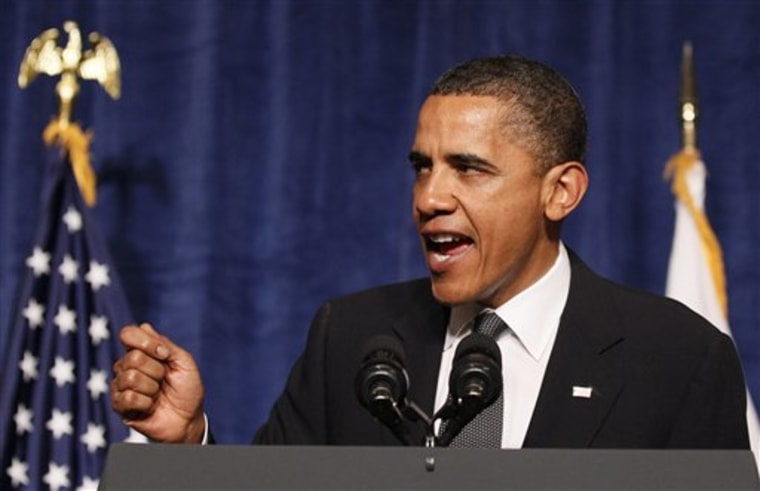The Obama administration's new national security strategy, in a formal break with the go-it-alone legacy of President George W. Bush, calls for the U.S. to use its massive military power in concert with friends and allies.
A summary of the U.S. National Security Strategy, obtained on Wednesday by The Associated Press, also makes the safety of Americans the highest security priority and calls for the U.S. to bolster its power through diplomatic and development efforts.
Presidents use the national security strategy document to set broad goals and priorities for keeping Americans safe. The document has far-reaching effects on spending, warcraft and security strategy and a rewrite can have significant consequences. For example, in 2002, President George W. Bush outlined a doctrine of pre-emptive war, a strategy that underpinned the war in Iraq.
The new strategy is expected to repudiate, at least implicitly, that doctrine.
Obama's top counterterrorism adviser, John Brennan, said Wednesday that the administration will add homegrown terrorism to the strategy document. Terror attacks like the Fort Hood shooting and the failed Times Square bombing have thrust homegrown terrorism into the spotlight recently, and U.S. citizens like Najibullah Zazi and David Headley have been charged with plotting terror attacks.
Obama's revision would be the first time that homegrown terror threats in the U.S. are a pillar of the document, reflecting the surge in new plots and criminal acts against the U.S. since the last strategy was released in 2006.
President Bill Clinton did not mention domestic terrorism in his 1998 revision after the Oklahoma City bombing three years earlier, and President George W. Bush made only passing reference to homegrown terrorism in the 2006 document.
"This is the first national security strategy of any president that integrates homeland security as part of a broader national security strategy," Brennan said. "The president's strategy is absolutely clear about the threat we face: Our enemy is not terrorism, because terrorism is but a tactic. Our enemy is not terror, because terror is a state of mind. And as Americans, we refuse to live in fear."
Instead, of "the war against terrorism," a constant catch phrase during the Bush administration, Brennan said the U.S. conflict is specifically aimed at al-Qaida and its terrorist allies, whom he described as "murderers."
Brennan also touched on the Obama administration's emphasis on international cooperation in thwarting al-Qaida and its affiliates — a clear theme in the new document.
He stressed "an international order that promotes peace, security, and opportunity through stronger cooperation, as this is the only path that will allow us to meet global challenges."
'Maintain the military advantage'
The full national security strategy, the first written by the current administration, enshrines policies that President Barack Obama has advocated since his election campaign. It will be the foundation for a National Military Strategy document, due soon.
"This strategy aims to renew American leadership in the 21st century by rebuilding the fundamental sources of American strength, security, prosperity and influence in the world," Brennan said.
The AP obtained the summary ahead of the document's planned release by the White House this week.
An unclassified memo to government offices on the rollout of the strategy, obtained by the Associated Press, outlines the general themes, listing sustaining the economic recovery as a chief concern, and then mentioning that the U.S. intends to "maintain the military advantage that is a cornerstone of our national defense."
The memo outlines withdrawing from Iraq, and "disrupting, dismantling and defeating al Qaida and its affiliates, with a focus on Afghanistan and Pakistan."
And the memo stresses "collective action" through "old alliances" and "new partnerships." That revisits a theme introduced recently by Defense Secretary Robert Gates, stressing work through partner nations to combat threats like violent extremism, rather than going it alone.
The memo adds, "We will lead on behalf of responsible action — so that nations thrive by meeting their responsibilities, and face consequences when they don't."
The memo encourages government officials to publicize those themes through a variety of outlets — including informal briefings, giving speeches at think tanks and using social media like Facebook to "highlight the release of the NSS, and invite feedback."
Reflecting universal values
The strategy makes it clear the United States intends to maintain the world's most powerful military, with unsurpassed reach and capability despite being stretched by two wars and other challenges.
The new security document says U.S. security goals should reflect universal values held by the United States since its founding.
Obama touched on many of the themes in the new strategy during a commencement address Saturday.
The U.S. must shape a world order relying as much on the persuasiveness of its diplomacy as the might of its military, he said.
Addressing nearly 1,000 graduating cadets at the U.S. Military Academy, Obama said all hands are required to solve the world's newest threats: terrorism, the spread of nuclear weapons, climate change and feeding and caring for a growing population.
Obama said the men and women who wear America's uniform cannot bear that responsibility by themselves. "The rest of us must do our part," he said.
"The burdens of this century cannot fall on our soldiers alone. It also cannot fall on American shoulders alone."
